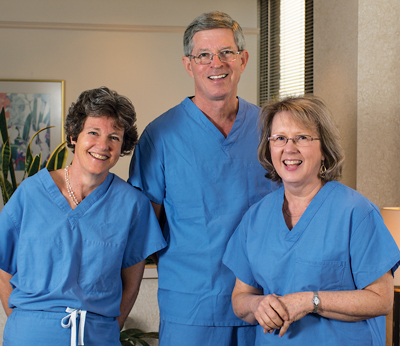
Motherhood connects women worldwide. Taking care of mothers means healthier families, less poverty, and stronger communities. Midwives for Haiti, a Richmond-based non-profit, has built a bridge from Virginia to Haiti to keep women alive to raise the children they bring into the world. The number of orphaned children in Haiti is estimated to be over 750,000. Midwives for Haiti saves women’s lives, allowing children to have mothers. There is no organization better suited to celebrate the month of mothers.
Despite the ups and downs of our constantly changing healthcare system, we Americans trust that our babies will be delivered with trained staff and access to emergency care. In our country, we don’t view pregnancy as a potential death sentence. In rural Haiti, obstetrical care is often nonexistent. Women live too far away from hospitals or birthing centers, and many communities have no access to medically trained help to assist with prenatal care, labor, and delivery, or postnatal follow-up. The consequence makes pregnancy and childbirth the number one killer of women in Haiti, where the lifetime risk of dying in childbirth is one in eighty-three. The statistics for children are even worse, with one out of every fourteen dying before their fifth birthday.
In the United States, it is not unusual for parents to celebrate and prepare for their baby well before giving birth. Nurseries are decorated and stocked with toys and layettes; cribs are bought; baby showers are hosted. When Haitian parents find out they are pregnant, they brace themselves for the possibility that the mom and/or the newborn might die. It’s not unusual for Haitian women to keep a safe detachment and wait to name their child until it appears likely the baby will survive. Initial mother-infant bonding may be difficult, especially if the woman has lost a baby before. In Haiti, motherhood is high risk.
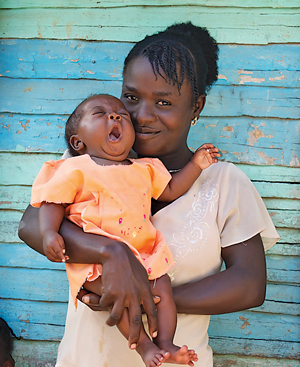
These grim statistics prompted Nadene Brunk, a certified nurse midwife who lives and works in Richmond, to take action. In 2003, Brunk visited Haiti for the first time as part of a medical team on a one-week service tour of care delivery. “It soon became obvious that this seven-day model was especially ill-suited for pregnant women,” says Brunk. In order to truly make a difference, Brunk recognized that pregnant women needed ongoing access to medical care. In 2005, she founded Midwives for Haiti (MFH) where she currently serves as executive director. “Nurse midwifery is based on the concept of low intervention,” explains Brunk, who spends part of every year training nurses in Haiti. “Nurse midwives support the natural process of birth, but are highly trained to screen for risk and recognize signs requiring life-saving medical intervention.” This model is ideal for Haiti, where the majority of births happen in the home. Not only is this tradition, it is often the only option due to lack of income, an inadequate number of trained medical professionals, limited transportation, and a dearth of hospitals, especially in rural areas. Too often, home births that could have had a good outcome with medical intervention end with fatalities.
There are four main causes of maternal death related to pregnancy: eclampsia (caused by high blood pressure), hemorrhage, infection, and obstructed labor. Recognizing what it takes to prevent or care for these issues is essential to saving lives.
“Too many Haitian women are dying who could’ve been saved with prenatal care, clean birth technique, or triage to a medical professional,” says Alice Hirata, MD, an OB-GYN with Virginia Women’s Center and perennial volunteer with MFG. “Mothers are the glue that hold families together. To lose so many is tragic.”
Dr. Hirata, inspired by her Virginia Women’s Center colleagues Brunk and MFH Medical Director Stephen Eads, MD, made a commitment to serve twice a year in Haiti. “MFH gives a voice, a purpose and empowers the women of Haiti. Our program provides jobs and a knowledge base that multiplies as women share their stories with each other,” says Dr. Hirata.
With education, basic medical supplies, and improved access to care, the risks of pregnancy and childbirth can be greatly decreased for Haitian women. In the ten plus years since this outreach program was founded, MFH has initiated a number of programs to reduce maternal and infant mortality.
Skilled birth attendant training is a prime example. This 12-month program trains Haitian nurses to become skilled birth attendants (SBAs) who specialize in identifying and treating high-risk pregnancies. The program started with nine committed nurse-students meeting outside around a donated blackboard. “Our goal is to empower through education rather than just provide services,” explains Brunk.
Now, ten years later, MFH has formal classroom space and has trained almost one hundred SBAs who have assisted in more than 60,000 prenatal care visits and over 12,000 deliveries.
It’s important to keep in mind that a typical Haitian hospital is very different from an American healthcare facility. Here in the United States, many hospitals offer birthing classes, nursery tours, and beautifully appointed labor and delivery suites. Many American women can choose to have epidurals to help minimize the pain that comes with pushing out a baby.
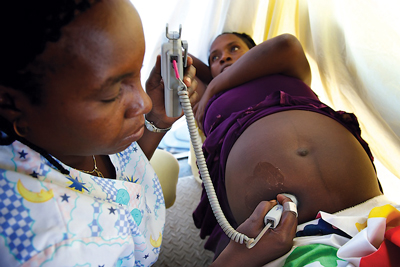
When MFH started, their first training site was St. Therese, a hospital that didn’t even have running water, toilets, showers, or electricity. It was a decaying structure where a family could bring their own sheets, food, and supplies, and expect to find a medically trained professional to help them with an emergency. Staffing was so limited that no one worked in the evenings or on weekends, and women felt unsafe staying overnight.
Now, thanks to the Haiti Ministry of Health, MFH, and other service organizations, St. Therese has a well for water, electricity, and adequate obstetric staffing. The hospital employs sixteen SBAs who work around the clock to meet obstetric demands. In 2013, for example, SBAs and MFH students who train at St. Therese attended to more than two thousand births.
The community now regards St. Therese as a safe place to give birth. Still, there is no such thing as a private suite. Multiple women give birth in the same large room without privacy. Epidurals aren’t part of the birthing plan.
SBAs are primarily based in hospitals, as they need to work where they can be paid and have access to supplies. This helps with Haiti’s extreme demand for obstetric health professionals, but it doesn’t benefit families who live too far away to get to a hospital. In rural communities, matròns are responsible for supporting women through childbirth. Matròns are traditional birth attendants who learned how to assist childbirth by other lay-women in the village, the knowledge passed down through generations. They have no formal training and limited education. Seventy-five percent of births in Haiti are attended solely by matròns. Although respected, wise, and essential community members, matròns often lack the basic knowledge and tools needed to help prevent and deal with complications of pregnancy. Since the majority of matròns can’t read, MFH developed songs to teach everything from cleanliness technique to understanding warning signs and symptoms.
Most homes in rural Haiti consist of little more than basic shelters with dirt floors, without plumbing or electricity. Before the matròn education program, many births were happening without even clean water and soap, increasing infection rates. “We take so much for granted here in the United States,” says Dr. Hirata. “The matròns are excellent caregivers and want to do the right thing for the mother, they just lack education. What is beautiful about matròn education is that it is far-reaching and it works with the system historically in place.”
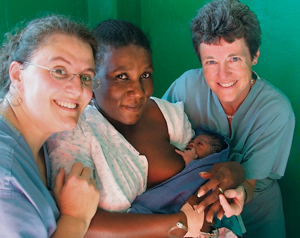
But there is still another side of the traditional system of care in Haiti. What we think of as witch doctors and voodoo are a big part of the Haitian culture. Without any medical training, symptoms like the seizures associated with eclampsia might be treated by beating or burning the pregnant woman to drive out evil spirits. Because of teaching through MFH, matròns now recognize symptoms associated with high-risk pregnancies and seek medical treatment. From one of her visits to Haiti, Dr. Hirata recalls a skit that the matròns performed to educate their community about eclampsia. They acted out a concerned husband taking his wife to the witch doctor because she was seizing. “The women sang and cried, ‘No! Don’t do it!’ and used all kinds of theatrics,” Dr. Hirata says. “Then in the next scene, a sister runs and gets a skilled birth attendant who saves the woman and her baby. The show ended to great applause.”
Besides being a wonderful memory, Dr. Hirata says she appreciates this example because it shows the education components that are taught by MFH are shared to work with the Haitian culture, not against it.
Unfortunately, even with recognition of high-risk symptoms, many women simply can’t leave their village. Most families don’t have vehicles or the money to pay a driver. Often, actual roads to the closest hospital don’t even exist. To address this common issue, MFH purchased two all-terrain vehicles to be used as mobile clinics. The trucks, a custom-built pink Jeep and an all-terrain SUV, have enabled SBAs to visit twenty different villages in the foothills of the Central Plateau region and provide more than 6,000 visits annually. Each pregnant woman receives education, an exam, vitamin and iron supplements, screening for sexually transmitted infections, malaria, vaginal infections, intestinal worms, and high blood pressure. Left untreated, these infections could be disastrous for mother and baby.
Brunk tells a story all too common in Haiti about a woman suffering from preeclampsia, high blood pressure during pregnancy that can lead to seizures, strokes and death. SBAs rushed her to the hospital in the pink Jeep, saving her life. Regrettably, too often this is not the case. Haitian women are at higher risk for eclampsia due to malnutrition, early chronic high blood pressure and lack of clean water. Early symptom recognition during prenatal assessments is key.
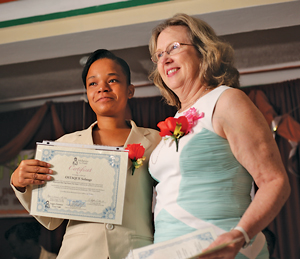
Adriane Neumeister, RN, a MFH volunteer and graduate of UVA’s School of Nursing, describes her experience with mobile outreach as humbling. “It was amazing to see the volume of work SBAs accomplished on each visit to a village. We’d travel two hours over mountains and across rivers to provide free prenatal care. If there wasn’t a facility to conduct a complete exam, they used the back of the truck.” Neumeister described the culture shock of coming from America where we don’t worry about the availability of things like medication, supplies, and a clean, comfortable place to give birth. “People get by with so little in Haiti. Everything is valued; nothing ever goes to waste. Midwives for Haiti works with the admirable Haitian ability to get the most out of every resource.” She says she tries not to leave Haiti behind when she returns to the United States, instead channeling the Haitian people’s fortitude and resilience. “It’s been one of the many gifts I’ve received from that country.”
While the mobile system is saving lives, MFH founder Brunk believes that building rural birthing centers throughout Haiti is the ultimate solution to care for high-risk pregnancies in remote areas. SBAs, mobile clinics, and the matròn outreach program have made a huge impact, but the reality is there often aren’t options for rural women during an emergency. Women who need a C-section or IV medication for hemorrhage or eclampsia aren’t able to get to the hospital at their time of need. Brunk’s hope is that these simple, focused birthing centers will provide needed access to physicians and midwives, especially for complicated deliveries.
“Haiti is a beautiful place, full of life, perseverance, and joy,” says Brunk. “Our organization is here for the basic reason that we don’t want mothers to die. Being pregnant, poor, and rural shouldn’t be a death sentence. If we don’t do this, who will?”
“We believe no mother or baby should die during pregnancy or childbirth.”
Here’s how to support Midwives for Haiti.
Ten Bucks = Two Lives
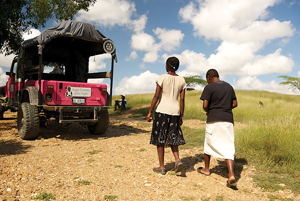 Support MFH’s Mobile Clinic Campaign
Support MFH’s Mobile Clinic Campaign
Haiti’s challenging topography combined with high-volume usage has put the pink Jeep, one of two vehicles Midwives for Haiti relied on for medical transport, out of commission.
“Our trucks take a beating because to get to villages in the foothills, we have to drive off-road,” explains Nadene Brunk of Richmond, the certified nurse midwife who founded MFH in 2005.
On average, six Haitian midwives see about six hundred women a month at twenty remote villages. That’s up to 120 mothers on a single day – and a lot of miles. “Our sturdy pink Jeep finally fell apart leaving us with only one SUV mobile clinic,” says Brunk.
To respond to this loss, MFH launched a fundraising campaign last month. Brunk says the goal is to raise $60,000 to cover the cost of seeing 6,000 women at $10 a visit.
The message? “$10 per visit. Two lives. Life Changing.” Please support the effort at Midwives for Haiti.
Photos courtesy: Cheryl Hanna-Truscott and Every Mother Counts



